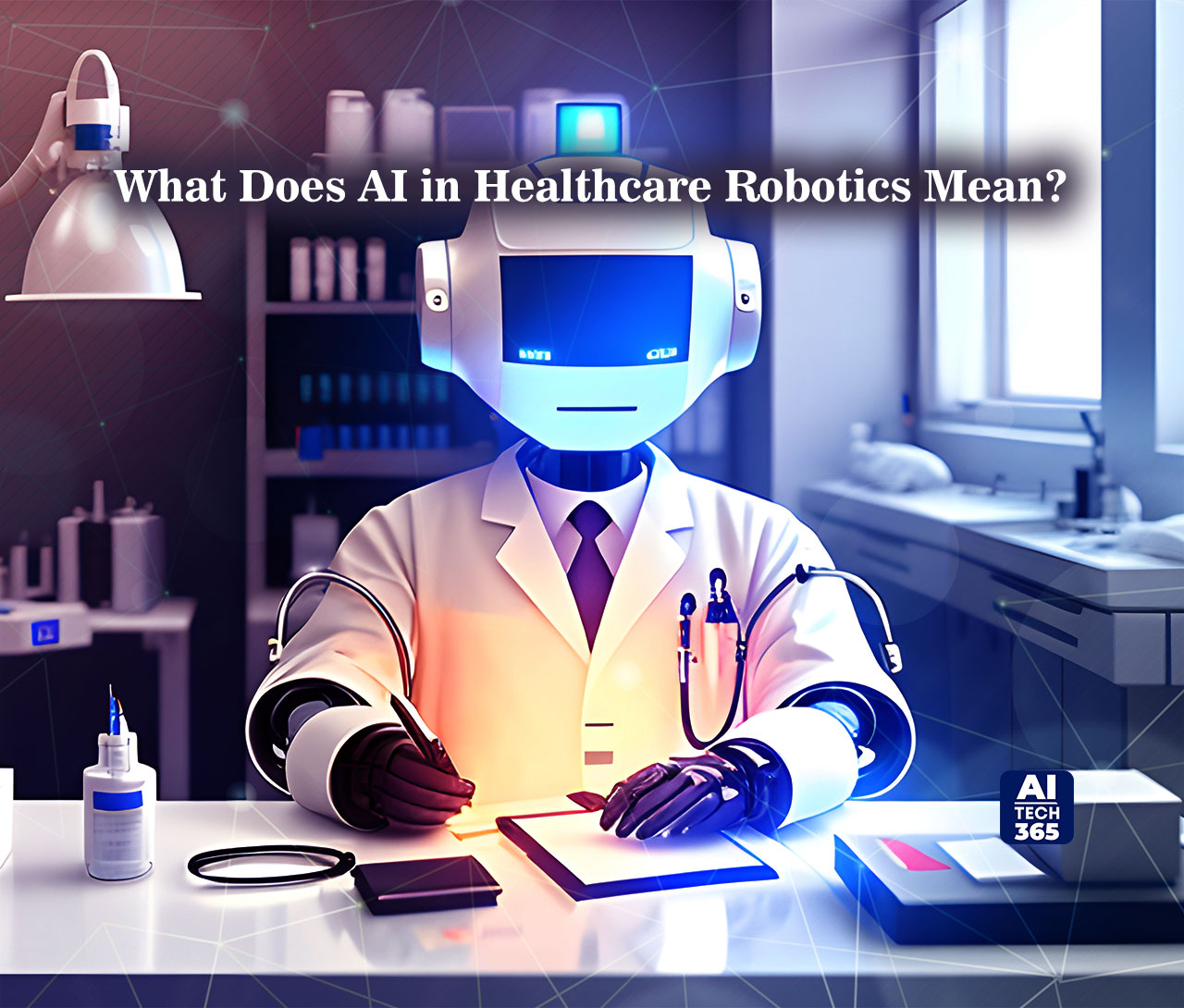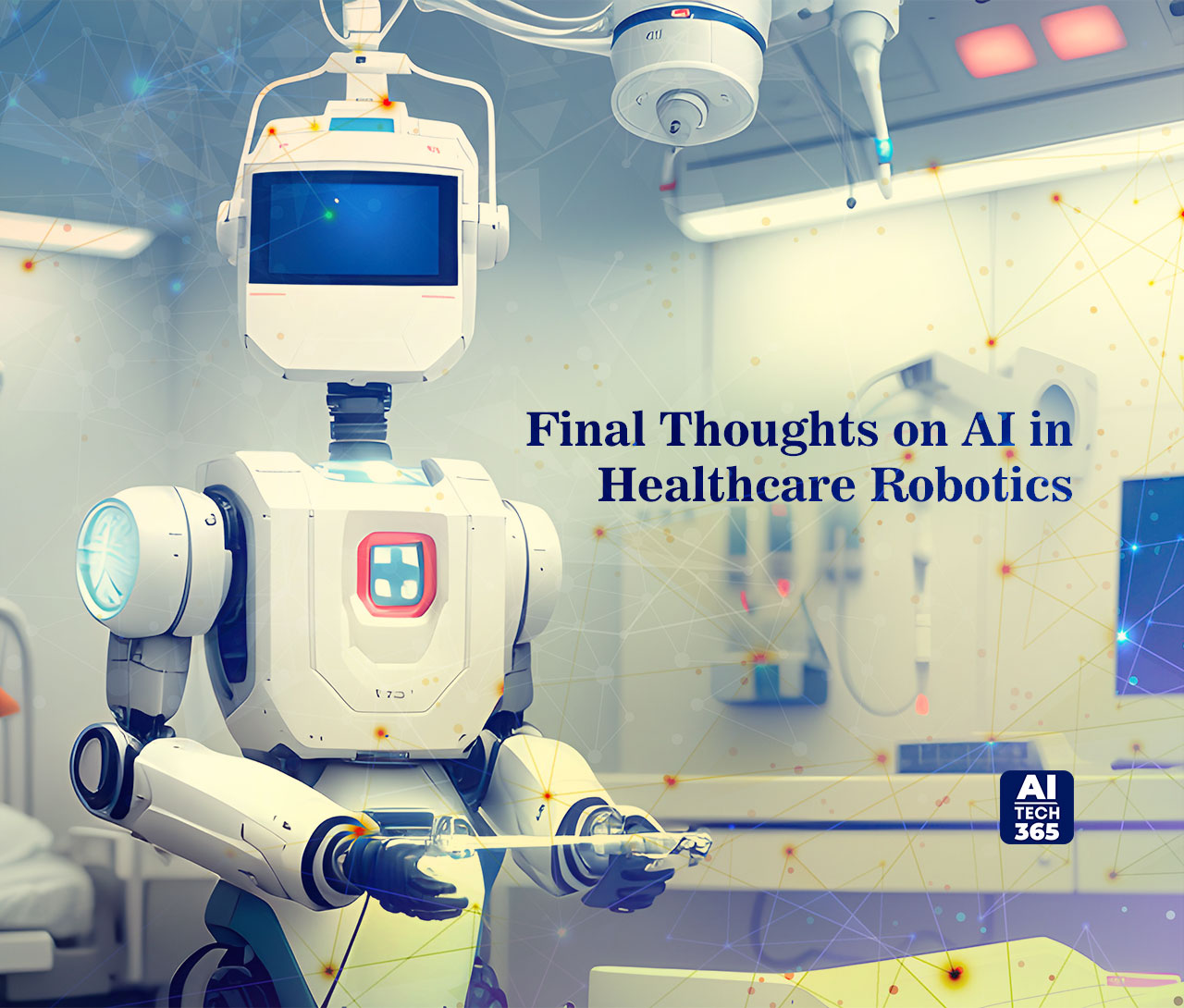Artificial intelligence has proven to be a valuable asset in simplifying the lives of patients, doctors, and hospital administrators. It takes on tasks traditionally performed by humans but does so more efficiently, in less time, and at a significantly reduced cost.
AI in healthcare robotics manifests in various forms, including identifying novel connections between genetic codes, empowering surgery-assisting robots, automating administrative duties, personalizing treatment options, and much more. Its versatile applications contribute to enhancing overall efficiency and effectiveness in the healthcare ecosystem. Without further ado, let’s delve into it.
What Does AI in Healthcare Robotics Mean?
 AI in healthcare robotics refers to the integration of artificial intelligence (AI) technologies and robotics in the healthcare industry. This combination holds immense potential for transforming healthcare practices and improving patient outcomes. It involves the use of sophisticated algorithms and machine learning techniques to enable robots to perform tasks traditionally carried out by humans, such as surgery, diagnostics, patient monitoring, and administrative tasks.
AI in healthcare robotics refers to the integration of artificial intelligence (AI) technologies and robotics in the healthcare industry. This combination holds immense potential for transforming healthcare practices and improving patient outcomes. It involves the use of sophisticated algorithms and machine learning techniques to enable robots to perform tasks traditionally carried out by humans, such as surgery, diagnostics, patient monitoring, and administrative tasks.
These AI-driven robots can enhance precision, efficiency, and consistency in medical procedures, leading to improved healthcare delivery. Additionally, AI in healthcare robotics can assist in data analysis, personalized treatment options, drug discovery, and managing healthcare data. While the field continues to evolve, it represents a promising frontier that can revolutionize the way healthcare is delivered, making it more efficient, accurate, and patient-centric.
5 Amazing Applications of AI in Healthcare Robotics
Now that we have a fair idea about AI in healthcare robotics, let’s see how it helps the medical industry.
AI in Medical Diagnosis
Every year, around 400,000 hospitalized patients experience preventable harm, resulting in approximately 100,000 deaths. The potential for improving the diagnostic process stands out as one of the most promising applications of AI in healthcare.
AI proves invaluable in addressing issues stemming from incomplete medical histories and the burden of large caseloads, which can contribute to deadly human errors. Unaffected by these variables, AI demonstrates the capability to predict and diagnose diseases at a faster rate than many medical professionals.
Example: Linus Health, through its early detection platform for cognitive assessments, is actively working to modernize brain health. The proprietary assessment technology, DCTclock, transforms the traditional pen-and-paper clock drawing test for early signs of cognitive impairment into a digital format. This innovation combines the latest advancements in neuroscience and AI to analyze over 50 metrics reflecting a patient’s cognitive function.
AI in Drug Discovery
The drug development sector faces significant challenges with escalating development costs and extensive research efforts consuming thousands of human hours. Clinical trials for each drug, on average, incur approximately $1.3 billion in costs, with only a 10 percent success rate in bringing drugs to market.
However, advancements in technology have prompted biopharmaceutical companies to recognize the potential benefits of AI. They are increasingly acknowledging the efficiency, accuracy, and knowledge that AI can bring to the drug development process.
Example: Reverie Labs is a pharmaceutical company leveraging computational chemistry and machine learning tools to advance drug discovery and design. Their approach involves utilizing predictive analytics tools and extensive databases with the overarching objective of gaining deeper insights into cancer and developing more effective treatments for the disease.
Also Read: How to Harness the Power of AI in Data Analysis: A Step-by-Step Guide
AI Revolutionizing Patient Experience
In the healthcare industry, time translates to money. Streamlining the patient experience efficiently enables hospitals, clinics, and physicians to attend to a larger number of patients daily. Research indicates that hospitals with positive patient experiences tend to achieve higher profits, whereas negative reviews can result in financial setbacks.
Example: Smart Tissue Autonomous Robot (STAR), can independently perform sutures without human intervention. Typically utilized by physicians for challenging surgeries, these systems, like the Da Vinci robot teleoperation, enable complex procedures through remote operation of robot arms. The artificial intelligence component focuses on identifying and eliminating unintentional hand movements, minimizing the potential for tissue damage.
AI in Healthcare Data Management
Healthcare stands on the precipice of becoming a significant frontier in big data management. Within the vast forest of trillions of data points, valuable information can often be lost. Moreover, the challenge of connecting crucial data points hampers progress in developing new drugs, preventive medicine, and accurate diagnosis.
A growing number of organizations and institutions in the healthcare sector are now embracing AI as a solution to halt the hemorrhaging of data. This technology is instrumental in dismantling data silos, enabling the swift connection of information in minutes, a task that used to take years to process.
AI in Rehabilitation
This is another prevalent intersection of artificial intelligence and medical robotics that emerges in the realm of rehabilitation and advanced prosthetics. A great example within this domain is the combination of a neural implant and a headset that is designed to restore sight for blind individuals by artificially activating photoreceptors in the brain’s visual cortex. The integration of various forms of AI to enhance rehabilitative practices is a valuable contribution to this evolving field.
Final Thoughts on AI in Healthcare Robotics
The role of AI in healthcare robotics holds tremendous potential for improving patient outcomes, reducing costs, and enhancing care delivery. By leveraging sophisticated algorithms and machine learning techniques, AI-driven robots can perform tasks traditionally carried out by humans, such as surgery, diagnostics, patient monitoring, and administrative duties. This combination of AI and robotics enables precision, efficiency, and consistency in medical procedures, leading to enhanced healthcare practices. Furthermore, it facilitates data analysis, personalized treatment options, drug discovery, and efficient management of healthcare data.


